Ear piercings are a popular form of body art, but they can sometimes lead to infections, especially when proper aftercare is not followed. Infections can occur if bacteria enter the piercing site through unclean tools, poor hygiene, or tight earrings that reduce blood flow.
Common symptoms of an infected ear piercing include redness, swelling, pain, and discharge of pus. For mild infections, topical antibiotics like Neosporin or Bacitracin can help treat the area. However, for more serious infections, oral antibiotics such as Cephalexin, Clindamycin, or Ciprofloxacin are needed to fully eliminate the infection.
Recommended Reading: Top 5 Best Antibiotics For Chest Infection (Fast Recovery)
Top 5 Antibiotics For Ear Piercing Infection (Infected Ear Piercing)

Table Of Contents
Recommended Reading: Antibiotics For Intestinal Bacterial Infection (Stop Vomiting And Diarrhea)
What are Ear Piercing Infection?
Ear Piercing Infection
An ear piercing infection occurs when bacteria enter the pierced area, causing redness, swelling, pain, or pus discharge.
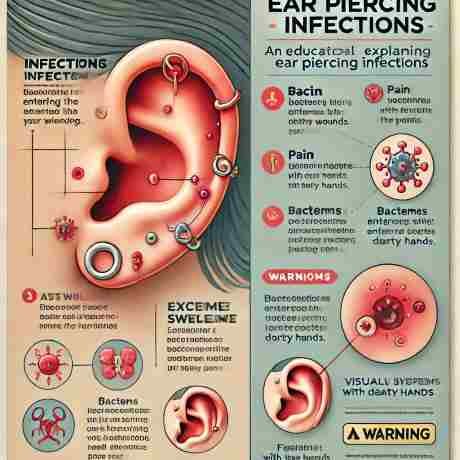
An ear piercing infection occurs when bacteria enter the pierced area, leading to redness, swelling, pain, or discharge. After getting your ears pierced, it’s common to experience mild discomfort, but if the area becomes swollen, painful, hot, or very red (or darker depending on your skin tone), it may indicate an infection.
Other signs include blood or pus leaking from the piercing. The pus can be white, yellow, or green, which often points to bacterial growth. You may also feel feverish, shivery, or generally unwell as the infection spreads. It’s important to treat these symptoms early to prevent the infection from worsening.
Recommended Reading: Best Vegan Brain Supplements (For Brain Health)
Causes of Ear Piercing Infection
- Unsterile Equipment: Using unclean tools or earrings during piercing can introduce bacteria to the wound.
- Improper Aftercare: Not cleaning the piercing regularly or touching it with dirty hands can lead to infection.
- Tight Earrings: Earrings that are too tight reduce blood flow, increasing the chances of infection.
- Trauma or Injury: Scratching, pulling, or rough handling of the piercing site can cause injuries that may become infected.
- Allergic Reactions: Some people are allergic to metals like nickel, which can cause inflammation and infection.
- Poor Hygiene: Not maintaining good personal hygiene can allow dirt and bacteria to accumulate around the piercing.
- Swimming in Dirty Water: Swimming in pools, lakes, or oceans with contaminated water can expose the piercing to harmful bacteria.
- Touching the Piercing Often: Constantly touching or rotating the earring with unclean hands increases the risk of infection.
- Using Unsuitable Earrings: Wearing earrings made of low-quality or non-hypoallergenic materials can irritate the skin, leading to infection.
- Sleeping on the Piercing: Pressure from sleeping on a fresh piercing can irritate the area, causing swelling and infection.
- Delayed Healing: Some piercings take longer to heal, making them more vulnerable to bacteria over time.
- Exposure to Sweat or Dust: Excessive sweat or dust can build up around the piercing, encouraging bacterial growth.
Recommended Readings: Antibiotics For Skin Rashes And Itching | Strongest Allergy Medicine
Symptoms of Ear Piercing Infections
Symptoms
Symptoms of an ear piercing infection include redness, swelling, pain, and pus discharge from the piercing site.
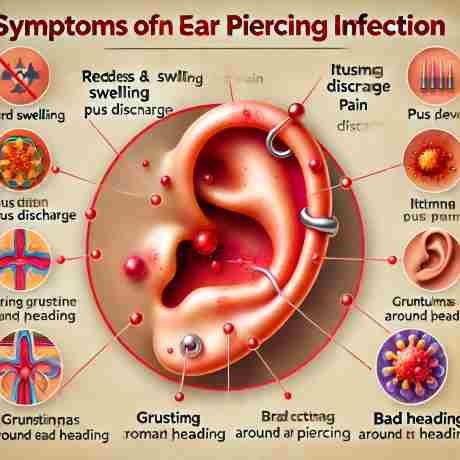
- Redness and Swelling: The skin around the piercing becomes noticeably red, swollen, and may feel warm.
- Discharge: If you notice pus coming out of the piercing, especially if it’s white, yellow, or green, it could be a sign of infection.
- Pain and Fever: Increased pain at the piercing site along with a fever or feeling unwell may indicate the infection is worsening.
- Itching and Irritation: Constant itching or a burning sensation around the piercing may signal an infection.
- Throbbing Pain: A steady, throbbing pain that doesn’t improve may suggest that bacteria have entered the wound.
- Granulomas: Small bumps, known as granulomas, can form around the piercing as the body responds to infection.
- Crusting Around Piercing: A crusty buildup around the pierced area may develop, which can indicate bacterial infection.
- Bleeding: Unusual or continued bleeding from the piercing site can be a sign of an underlying problem.
- Bad Odor: A foul smell coming from the piercing can be caused by bacteria thriving in the infected area.
- Prolonged Healing Time: If the piercing is taking longer than usual to heal, infection could be a factor.
- Increased Sensitivity: The area around the piercing becomes extra sensitive to touch, more than normal healing would cause.
Recommended Readings: Bacterial Infection In Anus Treatment | Fistula Treatment
Top 10 Antibiotics For Ear Piercing Infections
Best Antibiotics
Antibiotics for ear piercing infections help treat bacterial infections, reducing pain, and swelling, and preventing further complications.
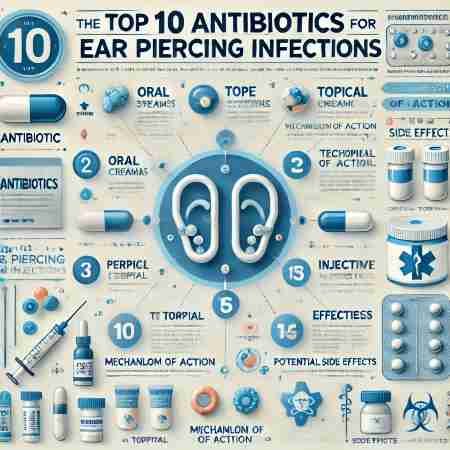
1. Cephalexin
- Type: Oral antibiotic
- Purpose: Cephalexin is used to treat skin infections caused by bacteria like Staphylococcus and Streptococcus.
- How It Works: It disrupts bacterial cell walls, leading to bacterial death.
- Effectiveness: Effective for both mild and severe ear piercing infections.
- Side Effects: May cause nausea, diarrhea, or stomach upset.
2. Clindamycin
- Type: Oral antibiotic
- Purpose: Often prescribed for patients allergic to penicillin, clindamycin targets a wide range of bacterial infections.
- How It Works: It prevents bacteria from making essential proteins, stopping their growth.
- Effectiveness: Highly effective for serious infections or abscesses in ear piercings.
- Side Effects: This can cause gastrointestinal issues such as diarrhea or stomach pain.
3. Ciprofloxacin
- Type: Oral antibiotic
- Purpose: Particularly effective against Pseudomonas bacteria, which can infect cartilage piercings.
- How It Works: It disrupts bacterial DNA replication, causing the bacteria to die.
- Effectiveness: Ideal for treating infections involving Pseudomonas.
- Side Effects: May cause dizziness, nausea, and light sensitivity.
4. Trimethoprim/Sulfamethoxazole (Bactrim)
- Type: Oral antibiotic
- Purpose: This combination drug treats a variety of bacterial skin infections, including those from piercings.
- How It Works: It blocks two key bacterial enzymes needed for their survival.
- Effectiveness: Commonly used for resistant infections.
- Side Effects: May cause rash, nausea, or sun sensitivity.
5. Mupirocin (Bactroban)
- Type: Topical antibiotic
- Purpose: Used to treat localized skin infections around piercings.
- How It Works: It stops bacteria from producing necessary proteins, leading to their death.
- Effectiveness: Best for minor surface infections or irritation.
- Side Effects: This may cause irritation or a burning sensation at the application site.
6. Amoxicillin
- Type: Oral antibiotic
- Purpose: A widely used antibiotic to treat bacterial infections, including those caused by ear piercings.
- How It Works: It kills bacteria by interfering with their cell wall formation.
- Effectiveness: Commonly prescribed for mild to moderate infections.
- Side Effects: Nausea, vomiting, or rash.
7. Azithromycin
- Type: Oral antibiotic
- Purpose: Used for a wide range of infections, including ear piercing infections.
- How It Works: Azithromycin inhibits protein synthesis in bacteria, stopping their growth.
- Effectiveness: Effective for mild to moderate infections.
- Side Effects: May cause diarrhea, stomach pain, or headaches.
8. Doxycycline
- Type: Oral antibiotic
- Purpose: Often prescribed for infections caused by bacteria in piercings.
- How It Works: Prevents bacteria from growing by inhibiting protein production.
- Effectiveness: Works well for more resistant bacterial strains.
- Side Effects: May cause sun sensitivity, upset stomach, or headaches.
9. Neomycin (Neosporin)
- Type: Topical antibiotic
- Purpose: Used to treat minor infections and prevent bacterial growth on the skin.
- How It Works: Kills bacteria by interfering with their protein synthesis.
- Effectiveness: Suitable for preventing mild infections in fresh piercings.
- Side Effects: This may cause local irritation or allergic reactions.
10. Ceftriaxone
- Type: Injectable antibiotic
- Purpose: Used for severe infections that require fast intervention.
- How It Works: Kills bacteria by disrupting their cell wall formation.
- Effectiveness: Effective for serious and deep infections.
- Side Effects: Pain at the injection site, rash, or allergic reactions.
Recommended Readings: Best Antibiotics For Acne And Pimples
Best Antibiotics For Ear Piercing Infections In Children
Best Antibiotics For Children
The best antibiotics for ear piercing infections in children typically include amoxicillin or topical ointments like mupirocin to treat bacterial infections effectively.
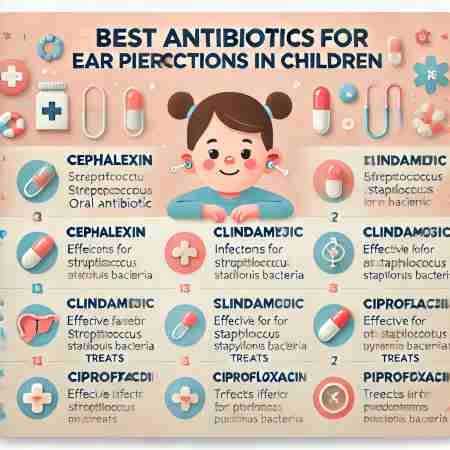
| Antibiotic | Type | Treats |
|---|---|---|
| Cephalexin | Oral antibiotic | Infections caused by Streptococcus and Staphylococcus bacteria. |
| Clindamycin | Oral antibiotic | Effective for Streptococcus and Staphylococcus infections, especially if allergic to penicillin. |
| Ciprofloxacin | Fluoroquinolone antibiotic | Treats infections caused by Pseudomonas bacteria. |
| Trimethoprim/Sulfamethoxazole | Oral antibiotic | Used for infections caused by Methicillin-Resistant Staphylococcus Aureus (MRSA). |
| Amoxicillin/Clavulanic Acid | Oral antibiotic | Broad-spectrum antibiotics are effective for many ear infections. |
| Azithromycin | Macrolide antibiotic | For patients allergic to penicillin, treats mild infections. |
| Dicloxacillin | Oral antibiotic | Effective against penicillin-resistant Staphylococcus. |
| Erythromycin | Macrolide antibiotic | Alternative for those allergic to penicillin, treats skin infections. |
| Doxycycline | Tetracycline antibiotic | Sometimes used for resistant infections in older children. |
| Mupirocin (topical) | Topical antibiotic | Applied directly to the infected piercing site to control localized infections. |
| Bacitracin (topical) | Topical antibiotic | For minor skin infections around the piercing site. |
Recommended Readings: The Counter Antibiotics For Tooth Infection
Best Antibiotics For Ear Piercing Infections In Adults
Best Antibiotics For Adults
For adults, the best antibiotics for ear piercing infections include oral antibiotics like cephalexin or topical options such as neomycin ointment.
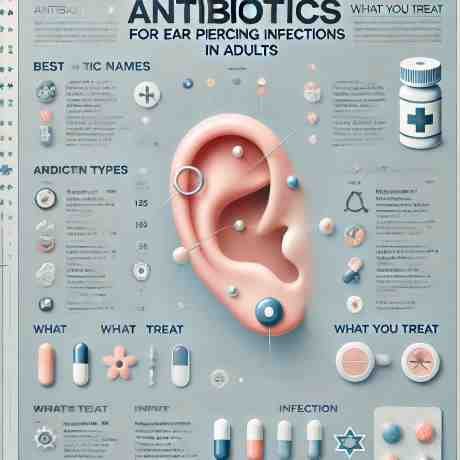
| Antibiotic | Type | Treats |
|---|---|---|
| Cephalexin | Oral antibiotic | Effective for Streptococcus and Staphylococcus bacteria. |
| Clindamycin | Oral antibiotic | Treats infections caused by Streptococcus and penicillin-resistant Staphylococcus. |
| Ciprofloxacin | Fluoroquinolone antibiotic | Used for infections caused by Pseudomonas bacteria. |
| Amoxicillin/Clavulanate | Oral antibiotic | A broad-spectrum antibiotic for treating multiple types of ear infections. |
| Trimethoprim/Sulfamethoxazole | Oral antibiotic | Treats infections caused by Methicillin-Resistant Staphylococcus Aureus (MRSA). |
| Doxycycline | Tetracycline antibiotic | Used in resistant or severe infections in adults. |
| Azithromycin | Macrolide antibiotic | An alternative for those allergic to penicillin, treats mild infections. |
| Mupirocin (topical) | Topical antibiotic | Effective for treating localized skin infections around the piercing. |
| Bacitracin (topical) | Topical antibiotic | Used for superficial skin infections at the piercing site. |
| Neosporin (topical) | Topical antibiotic | Over-the-counter ointment for mild infections. |
Recommended Readings: Best Antibiotic For Breast Infection | Breast Infection Treatment
Antihistamines For Ear Piercing Infection
Antihistamines For Ear Piercing Infection
Antihistamines can help reduce itching and swelling caused by allergic reactions during an ear-piercing infection.
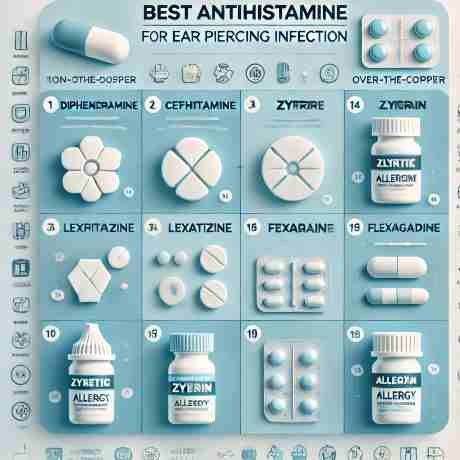
| Antihistamine | Type | Purpose |
|---|---|---|
| Diphenhydramine (Benadryl) | Oral, Over-the-counter | Reduces itching and swelling caused by an allergic reaction. |
| Cetirizine (Zyrtec) | Oral, Over-the-counter | Helps with itching and mild allergic reactions without causing drowsiness. |
| Loratadine (Claritin) | Oral, Over-the-counter | Non-drowsy antihistamine for allergic reactions and swelling. |
| Fexofenadine (Allegra) | Oral, Over-the-counter | Effective for reducing swelling and itching. |
| Chlorpheniramine (Chlor-Trimeton) | Oral, Over-the-counter | Helps with itchiness and irritation but may cause drowsiness. |
| Levocetirizine (Xyzal) | Oral, Over-the-counter | Long-lasting antihistamine for itch relief and allergies. |
| Hydroxyzine (Atarax) | Prescription oral | Used for stronger allergic reactions or persistent itching. |
| Rupatadine | Oral, Prescription | Helps with swelling and allergies related to piercings. |
| Meclizine (Antivert) | Oral, Over-the-counter | Provides relief for itching and allergies. |
| Desloratadine (Clarinex) | Oral, Prescription | Non-drowsy antihistamine for reducing itching and swelling. |
Recommended Readings: Antibiotics For Stomach Infection | Antibiotics For Gastroenteritis
Home Remedies For Ear Piercing Infections
Home Remedies For Ear Piercing Infections
Home remedies for ear piercing infections include cleaning with saline solution, applying warm compresses, and using tea tree oil for its antibacterial properties.
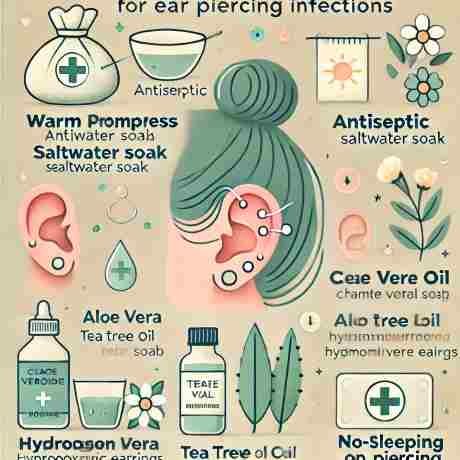
| Remedy/Tip | Details |
|---|---|
| Warm Compress | Apply a warm compress to the infected area to reduce swelling and ease discomfort. |
| Antiseptic Solutions | Clean the piercing site twice a day with a sterile saline solution or antiseptic. |
| Avoid Tight Jewelry | Ensure earrings are not too tight to avoid restricting blood flow, which worsens infection. |
| Use Saltwater Soak | Soak the piercing in a solution of salt and warm water to reduce bacteria. |
| Tea Tree Oil | Apply diluted tea tree oil to the area to help kill bacteria and soothe irritation. |
| Aloe Vera Gel | Apply aloe vera gel to the piercing to reduce inflammation and promote healing. |
| Chamomile Compress | Use a chamomile tea bag compress to soothe and heal the infected area naturally. |
| Keep Piercing Dry | Avoid getting the piercing wet, especially from pools or sweat, to prevent bacterial growth. |
| Hydrogen Peroxide | Clean the piercing with diluted hydrogen peroxide to remove bacteria, but don’t overuse it. |
| Change to Hypoallergenic Jewelry | Switch to hypoallergenic earrings like surgical steel or gold to reduce irritation. |
| Avoid Sleeping on Piercing | Prevent pressure on the piercing by sleeping on the opposite side to avoid irritation. |
Recommended Readings: Best Antibiotics For Vaginal Infection | Vaginal Itching
Risks and Complications of Piercing Infections
- Allergic Reactions: Some people may have allergic responses to metals like nickel found in earrings, causing irritation, redness, or rash.
- Keloids and Scarring: A keloid is an overgrowth of scar tissue that can form around the piercing, resulting in a noticeable, sometimes painful lump.
- Severe Infections: If the infection is not treated, it may spread beyond the ear, potentially causing serious conditions like septicemia (blood infection).
- Abscesses: Pus may gather under the skin, forming abscesses that are painful and may need to be drained by a healthcare professional.
- Prolonged Healing: An untreated infection can slow down the healing process, making it difficult for the piercing to recover fully.
- Damage to Surrounding Tissue: Infections can affect nearby tissues, causing further complications such as swelling and damage.
- Ear Deformities: Severe infections, if left untreated, can lead to permanent changes in the shape or appearance of the ear.
- Recurrent Infections: Once an infection occurs, the area might be more prone to future infections or irritation, especially if proper care isn’t followed.
- Pain and Discomfort: Ongoing infection can cause long-lasting pain and tenderness around the piercing site, making it difficult to wear earrings.
- Need for Surgical Intervention: In rare cases, severe complications may require surgical treatment to remove damaged tissue or address scarring.
When to Seek Medical Care
- Persistent Redness, Swelling, or Pain: If the redness, swelling, or pain around the piercing doesn’t improve after a few days, it may indicate a more serious infection that requires medical treatment.
- Fever or General Feeling of Unwellness: Developing a fever or feeling generally unwell could mean the infection is spreading. It’s essential to seek medical advice right away if this happens.
- Thick, Foul-Smelling Discharge: If you notice thick, smelly pus or discharge coming from the piercing site, it’s a sign of infection. This could require antibiotics or professional care to clear up.
- Earring Stuck or Abscess Formation: If the earring gets stuck in the ear or you develop an abscess (a painful lump of pus under the skin), it’s crucial to get medical help. An abscess may need to be drained by a doctor.
Recommended Readings: The Counter Antibiotics For Tooth Infection
Side Effects of Ear Piercing
- Infections: Redness, swelling, discharge, abscesses, septicemia risk
- Allergic Reactions: Metal allergies, itching, redness
- Scarring: Keloids, hypertrophic scars
- Bleeding: Excessive bleeding, jewelry rejection, embedded earrings
- Deformities: Earlobe deformities, pressure sores
Side Effects in Babies:
- Infections: Redness, pain, discharge
- Embedded Earrings: Earrings stuck inside the ear
- Keloids: Scar tissue growth
- Tearing: Earlobe tearing
- Deformation: Auricle deformities
- Allergic Reactions: Metal irritation, swelling
Recommended Readings: Antibiotics For UTI | Antibiotics For UTI In Men+Women
FAQs
What Causes Ear Piercing Infections?
Ear piercing infections are caused when bacteria enter the piercing site. Common causes include using unsterile equipment during the piercing process, touching the piercing with dirty hands, or not cleaning the area properly. Tight earrings that reduce blood flow and allergic reactions to certain metals like nickel can also lead to infection.
What Are the Symptoms of an Infected Ear Piercing?
Signs of an infected ear piercing include:
Redness and swelling around the piercing.
Pain that may increase over time.
Pus discharge, which can be white, yellow, or green.
Fever or feeling unwell if the infection spreads.
Crusting around the piercing and a possible bad odor.
How Can I Treat an Infected Ear Piercing at Home?
For mild infections, applying a topical antibiotic ointment like Neosporin or Bacitracin can help. Keep the area clean by washing it with a mild saline solution and avoid touching or rotating the earring unnecessarily.
When Should I See a Doctor for an Ear Piercing Infection?
You should see a doctor if:
The infection worsens despite home treatment.
You experience severe pain, fever, or pus discharge that continues.
The infection spreads beyond the piercing site, causing swelling or redness in other areas. In such cases, oral antibiotics like Cephalexin or Clindamycin may be required to fully treat the infection.
What Are the Best Antibiotics for Ear Piercing Infections?
Cephalexin: An oral antibiotic effective against bacterial infections.
Clindamycin: Useful for those allergic to penicillin, targets a broad range of infections.
Ciprofloxacin: Specifically treats infections in cartilage piercings caused by Pseudomonas bacteria.
Mupirocin (topical): Best for minor surface infections around the piercing.
What Are Some Home Remedies for Treating Ear Piercing Infections?
Some home remedies can help alleviate symptoms:
Saline solution: Clean the area with a mild saline solution to reduce bacteria.
Warm compress: Apply a warm compress to the infected area to reduce pain and swelling.
Tea tree oil: Some people find diluted tea tree oil helpful as an antiseptic, but always consult a doctor before using alternative treatments.
Can Ear Piercing Infections Lead to Serious Complications?
Yes, if left untreated, ear piercing infections can lead to:
Abscesses or collections of pus under the skin.
Cartilage damage, especially in infections involving the upper ear.
Systemic infections, where bacteria spread to other parts of the body, cause severe health issues.
Recommended Readings: Best Antibiotics For Strep Throat | Strep Throat Antibiotics
Conclusion
Ear piercing infections are treatable with both topical and oral antibiotics, depending on how severe the infection is. Medications like Cephalexin, Clindamycin, and Ciprofloxacin are commonly prescribed to alleviate symptoms and prevent further complications.
However, the key to avoiding infections lies in proper aftercare. Cleaning the pierced area regularly, using sterile equipment, and choosing hypoallergenic jewelry can go a long way in preventing infections from occurring.
Disclaimer
Commissions we earn from partner links on this page do not influence our content. Our editorial content is based on thorough research and insights from qualified medical professionals to ensure the highest standards of accuracy and reliability.
Information provided on Doseway is for educational purposes only. Your health and wellness are unique to you, and the products and services we review may not be suitable for your circumstances. We do not offer personal medical advice, diagnosis, or treatment plans. For specific advice, please consult with a healthcare professional. Doseway adheres to strict editorial integrity standards. To the best of our knowledge, all content is accurate as of the date posted, though offers and information may change. The opinions expressed are the author’s own and have not been influenced, approved, or endorsed by our partners.

 Cart is empty
Cart is empty
Add a Comment